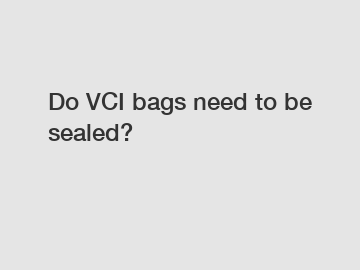Do VCI bags need to be sealed?
Do VCI Bags Need to be Sealed?
VCI bags, also known as Volatile Corrosion Inhibitor bags, are widely used to protect metal parts and equipment from corrosion during storage and transportation. However, many people wonder if these bags need to be sealed tightly for optimal protection. In this article, we will explore the importance of sealing VCI bags, the potential risks of not sealing them properly, and the best practices for ensuring maximum corrosion protection.
1. What are VCI bags?

VCI bags are specifically designed to provide a protective barrier against corrosion. They are made from a special type of plastic that contains volatile corrosion inhibitors. These inhibitors vaporize and then condense on the metal surface, creating a thin layer that prevents corrosion. VCI bags are commonly used in industries such as automotive, aerospace, electronics, and military, where metal parts need to be stored or transported for extended periods.
2. The significance of sealing VCI bags.
Sealing VCI bags is crucial in preserving their effectiveness. While these bags are designed to emit VCI, their efficiency can be compromised if they are not properly sealed. The purpose of sealing is to contain the VCI inside the bag and create an airtight environment. Without a proper seal, VCI may escape, leading to reduced corrosion protection. Additionally, an unsealed VCI bag leaves the metal parts vulnerable to moisture and other contaminants, which can accelerate the corrosion process.
3. Risks of not sealing VCI bags.
Not sealing VCI bags can have several adverse effects on the protected metal components. Firstly, the escaped VCI molecules may become diluted in the surrounding air, reducing their concentration on the metal surface. This dilution weakens the VCI's ability to form a protective barrier against corrosion. Moreover, without a sealed bag, the VCI may disperse too quickly, compromising its effectiveness. Moisture and contaminants can penetrate the bag easily, negating the corrosion protection offered by VCI.
4. Best practices for sealing VCI bags.
To ensure maximum corrosion protection, it is essential to follow these best practices for sealing VCI bags:
a. Remove any excess air: Before sealing the bag, remove as much air as possible. Excess air can contain moisture and other contaminants that may compromise the VCI's effectiveness. Using a vacuum sealer or compression equipment can help to eliminate excess air.
b. Double-check the seal: After sealing the bag, carefully inspect the seal to ensure it is fully closed. Any gaps or leaks can allow moisture and contaminants to enter, reducing the corrosion protection.
c. Use appropriate sealing methods: Various sealing methods are available for VCI bags, including heat sealing, adhesive sealing, and zip-lock sealing. Depending on the type of VCI bag and the equipment available, select the most suitable sealing method to achieve a tight seal.
d. Store bags in a controlled environment: Once the VCI bags are sealed, store them in a controlled environment with low humidity and temperature stability. This further minimizes the risk of moisture entering the bags and compromising the corrosion protection.
5. The importance of periodic inspection.
While sealing VCI bags is crucial, periodic inspection is equally important to ensure ongoing corrosion protection. Regularly check the sealed bags for any signs of damage or leaks. If any issues are detected, reseal the bag or replace it with a new one. Maintaining the integrity of the sealed VCI bags throughout the storage or transportation process is essential for sustained corrosion protection.
In conclusion, it is evident that VCI bags need to be sealed tightly to provide optimal corrosion protection. Proper sealing prevents VCI from escaping and ensures an airtight environment necessary for the inhibitors to form a protective layer on metal surfaces. Failure to seal VCI bags correctly can result in reduced corrosion protection, quick dispersal of VCI, and increased risks of moisture and contaminant penetration. By following best practices for sealing VCI bags, including removing excess air, double-checking the seal, and using appropriate sealing methods, industries can safeguard their metal parts and equipment from corrosion effectively.
If you want to learn more, please visit our website Vci Packaging Ziplock Bag from China, Aluminum Foil Anti Static, Vci Bags Wholesale.

Comments